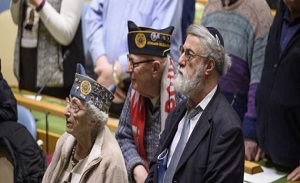International day commemorating victims of Holocaust of profound importance, says UN human rights chief
 Volker Türk, the UN Human Rights chief has said the day commemorating the Holocaust is one of "profound importance."
Volker Türk, the UN Human Rights chief has said the day commemorating the Holocaust is one of "profound importance."
Türk made his statement for the day, on Jan. 27, that commemorates the liberation of the Auschwitz concentration camp in Poland during the final days of the Second World War.
"We remember and honour the millions of victims of the Nazi Holocaust – children, women and men on whom atrocious suffering and injustice were inflicted by an abominable machinery of mass murder," said the UN Human Rights chief who is from Austria,
He said six that around six million Jews were murdered in the Holocaust, 1.5 million of them children.
Millions of other people from targeted groups were also murdered, including Roma and Sinti people; Slavs; people with disabilities; LGBTIQ people; members of resistance networks; and other opponents of Nazism.
Pope Francis recalled earlier in the week the extermination of millions of Jews in calling for the Holocaust Day of Remembrance to reaffirm that war can never be justified and only benefits weapons makers.
At the end of his weekly general audience, Francis referred to the Jan. 27 commemoration, which Vatican News said has become fraught this year given Israel's military campaign in Gaza and a rise in antisemitism in Europe and around the world.
"The remembrance and condemnation of that horrific extermination of millions of Jews and of other faiths, which occurred in the first half of the last century, help us all not to forget that the logic of hatred and violence can never be justified, because they deny our very humanity," Francis said.
Six extermination camps, at Auschwitz-Birkenau, Belzec, Chelmno, Majdanek, Sobibor and Treblinka, were equipped with machinery designed specifically for killing on a massive, industrial scale.
About one million Jews were killed at Auschwitz alone.
Millions more were imprisoned, abused and murdered in a vast network of thousands of other concentration camps, where they were forced into slave labor, including sexual slavery, and medical experimentation.
The scale of these crimes engaged many perpetrators said the UN.
The Nazi concentration camps and death trains were staffed.
The victims had often been identified to the police, and therefore sent to their deaths, by people whom they knew.
Countless bystanders looked away from – or were indifferent to – what they must have suspected was extraordinary, inhuman brutality.
"The dehumanisation that enabled the Holocaust – the depth and scale of this failure of empathy and fellow-feeling for other human beings – is incomprehensible and terrifying," said Türk.
"It is our duty to seek answers to how these crimes could have been prevented. If we do not, they could happen again."
As part of this work, and in the face of genocide denial, it is essential to ensure accurate historical knowledge of the Holocaust, or Shoah, in all its appalling detail said the UN rights chief.
The UN said that the testimony of survivors of the Holocaust is both essential to that work, and extremely painful.
Source: ecumenicalnews.com
